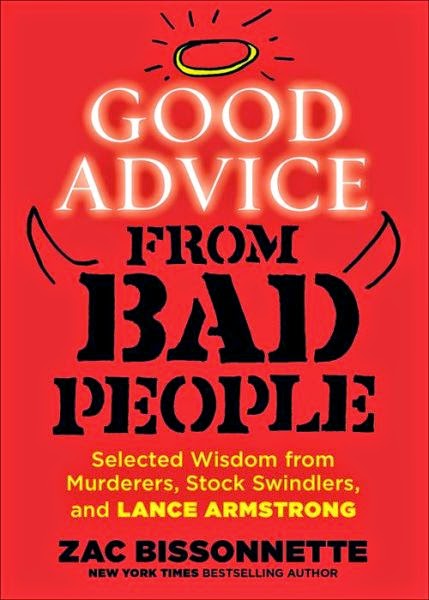Zac Bissonnette's new book is called Good Advice from Bad People
That's an amusing and fun premise for a slim humor book -- which this basically is -- so we can all forgive Bissonnette the very slightly misleading title. (It's certainly snappier than Look at all of These Hypocrites, or Quotes from Lying Liars and Cheating Cheats.)
He's chosen well: Lance Armstrong is called out on the cover, and he includes the expected religious do-as-I-say types (Swaggart, Schuller, Haggard, Osteen, Dollar, Bakker) and plenty of political figures (Bush II, Cain, Blagojevich, Corzine, McNamara, Edwards, Nixon, Rumsfeld, Spitzer, Gingrich) along with the out-and-out cheaters and liars (Jonah Lehrer, Madoff, Simpson) who flow into the fallen sports heroes (Dykstra, Pettittie, Sandusky, Pistorius, A-Rod) and a few outright psychopaths (such as Jim Jones). This is a pop-culture book, so it skews recent -- I didn't do a careful study, but my impressions is that the earliest quotes are from the 1970s, and that most of them cluster in the last two decades. That's to be expected: this is a book that reminds you of people you already hate, and gives you good reasons to continue hating them. And, yes, Donald Trump is definitely included.
Some of the quotes are not quite as pointed and ironic as I expected, though it's difficult to tell if that's because there just isn't a perfect quote from, say, David Vitter, or if Bissonnette stopped his research in each case when he found a "good enough" quote. (I have to assume that he started with the bad people and worked backwards to the good advice.) Still, this book is a lovely dose of Schadenfreude for those who enjoy that, and you'd be hard-pressed to find a better book to satisfy that particular urge.
Book-A-Day 2014 Introduction and Index

No comments:
Post a Comment